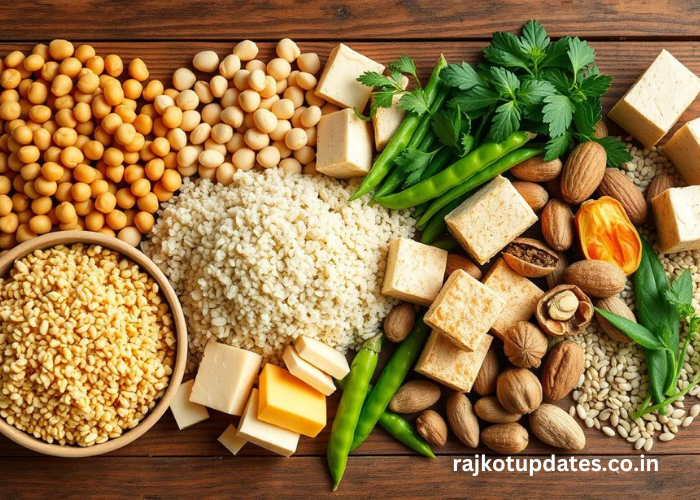Weight loss is a journey that many embark on, but finding the right approach can be challenging. Among the various strategies, increasing protein intake has proven to be one of the most effective methods for losing weight and maintaining muscle mass. Protein plays a crucial role in reducing appetite, increasing metabolism, and promoting satiety, making it an essential component of a successful weight loss plan. In this article, we will explore the benefits of eating protein-rich foods for weight loss, the best protein sources, and how to incorporate them into your diet effectively.
The Role of Protein in Weight Loss
Protein is a macronutrient that is essential for building and repairing tissues, producing enzymes and hormones, and maintaining muscle mass. When it comes to weight loss, protein is particularly beneficial because it helps reduce hunger and increase the feeling of fullness.
This is due to its ability to influence the production of appetite-regulating hormones, such as ghrelin and peptide YY. Additionally, protein requires more energy to digest than carbohydrates or fats, which means that the body burns more calories processing protein. This process, known as the thermic effect of food, contributes to a higher metabolic rate and aids in weight loss.
How Protein Increases Satiety
One of the primary reasons protein is effective for weight loss is its ability to increase satiety, the feeling of fullness that reduces overall food intake. Protein affects several hormones that regulate hunger, including reducing the levels of ghrelin, the hunger hormone, and increasing levels of peptide YY, a hormone that makes you feel full.
This hormonal effect helps control appetite and reduce cravings, making it easier to stick to a calorie-controlled diet. Consuming protein-rich foods at each meal can help prevent overeating and support long-term weight loss goals.
The Thermic Effect of Protein
The thermic effect of food (TEF) refers to the increase in metabolic rate that occurs after eating, as the body uses energy to digest, absorb, and metabolize nutrients. Protein has the highest TEF of all macronutrients, with approximately 20-30% of the calories from protein being used for digestion and metabolism, compared to 5-10% for carbohydrates and 0-3% for fats.
This means that by eating more protein, you naturally increase the number of calories your body burns, which can contribute to a calorie deficit and support weight loss.
Protein and Muscle Preservation
When losing weight, it’s important to preserve muscle mass, as muscle is more metabolically active than fat and contributes to a higher resting metabolic rate. Consuming adequate protein helps maintain muscle mass during weight loss, preventing the loss of lean body tissue that can occur with calorie restriction.
Preserving muscle mass not only supports a healthy metabolism but also helps maintain strength and physical performance. Including protein-rich foods in your diet can ensure that weight loss comes primarily from fat, rather than muscle.
Best Protein Sources for Weight Loss
Not all protein sources are created equal, and some are better suited for weight loss than others. Lean proteins, such as chicken breast, turkey, fish, eggs, and plant-based proteins like legumes and tofu, are excellent choices. These foods are low in calories and high in protein, making them ideal for creating a calorie deficit while meeting protein needs.
Additionally, dairy products like Greek yogurt and cottage cheese offer a good balance of protein and other nutrients that support weight loss. Incorporating a variety of these protein sources into your diet can help ensure you get all the essential amino acids needed for health and muscle maintenance.
How Much Protein Do You Need for Weight Loss?
The amount of protein you need for weight loss depends on various factors, including your age, gender, weight, activity level, and overall health goals. However, a general guideline is to consume between 1.2 to 1.6 grams of protein per kilogram of body weight.
For someone weighing 70 kilograms (154 pounds), this would equate to 84 to 112 grams of protein per day. Some experts recommend even higher intake levels for those who are very active or looking to preserve muscle mass during weight loss. It’s important to distribute protein intake evenly throughout the day, consuming it at each meal to maximize its benefits.
Timing Your Protein Intake
The timing of protein intake can also play a role in weight loss and muscle preservation. Research suggests that consuming protein at regular intervals throughout the day, particularly at breakfast, can help control hunger and reduce overall calorie intake.
Starting the day with a high-protein breakfast can stabilize blood sugar levels, reduce cravings, and provide sustained energy, making it easier to resist unhealthy snacks later in the day. Additionally, consuming protein after workouts is beneficial for muscle repair and recovery, supporting the maintenance of lean body mass.
High-Protein Breakfast Ideas
Starting your day with a high-protein breakfast can set the tone for the rest of the day and help you stay on track with your weight loss goals. Some excellent high-protein breakfast options include scrambled eggs with spinach and feta, Greek yogurt with mixed berries and nuts, or a protein smoothie made with protein powder, spinach, and almond milk.
These meals provide a balance of protein, healthy fats, and fiber, keeping you full and satisfied until your next meal. Incorporating protein into your breakfast routine can prevent mid-morning hunger and reduce overall calorie consumption.
Protein-Rich Snacks for Weight Loss
Snacking can be a challenge when trying to lose weight, but choosing protein-rich snacks can help manage hunger and reduce the temptation to indulge in high-calorie, low-nutrient foods. Some healthy, protein-rich snack options include hard-boiled eggs, cottage cheese with cucumber slices, a handful of almonds or walnuts, or a small portion of lean turkey or chicken breast.
These snacks are not only satisfying but also help maintain energy levels and prevent overeating at meal times. Keeping protein-rich snacks on hand can support your weight loss efforts by providing a nutritious option when hunger strikes.
Combining Protein with Other Nutrients
While protein is essential for weight loss, it’s important to remember that a balanced diet includes a variety of nutrients. Combining protein with healthy fats and fiber-rich carbohydrates can enhance satiety and support overall health.
For example, pairing lean protein with vegetables and whole grains provides a mix of nutrients that can help regulate blood sugar levels, improve digestion, and keep you full longer. Including a variety of nutrient-dense foods in your diet ensures that you get the vitamins, minerals, and antioxidants needed for overall well-being while supporting your weight loss goals.
Plant-Based Protein Options
For those following a vegetarian or vegan diet, plant-based proteins are an excellent option for weight loss. Foods like lentils, chickpeas, quinoa, tofu, tempeh, and edamame are rich in protein and also provide fiber, which is beneficial for digestion and satiety.
Plant-based proteins can be incorporated into a variety of dishes, from salads and stir-fries to soups and grain bowls. These foods not only help meet protein needs but also offer additional health benefits, such as reducing the risk of chronic diseases. Including a variety of plant-based proteins in your diet can support weight loss while promoting overall health.
The Benefits of Protein Supplements
For those who struggle to meet their protein needs through food alone, protein supplements can be a convenient option. Protein powders, such as whey, casein, and plant-based options like pea or hemp protein, can be added to smoothies, oatmeal, or baked goods to boost protein intake. Protein bars are another convenient option for on-the-go snacks.
While whole foods should be the primary source of protein, supplements can help fill gaps in your diet, especially for those with higher protein needs or dietary restrictions. Choosing a high-quality protein supplement can support your weight loss efforts without adding unnecessary calories.
Avoiding Common Pitfalls with Protein
While increasing protein intake can support weight loss, it’s important to avoid common pitfalls that can derail your progress. Overeating protein-rich foods that are also high in fat or calories, such as fatty cuts of meat, full-fat dairy, or processed protein snacks, can lead to excess calorie intake.
Additionally, relying too heavily on protein supplements without incorporating a variety of whole foods can result in nutrient imbalances. It’s important to choose lean, nutrient-dense protein sources and maintain a balanced diet that includes a variety of food groups to ensure overall health and successful weight loss.
Protein and Long-Term Weight Maintenance
One of the biggest challenges with weight loss is maintaining the results long-term. Protein plays a key role in weight maintenance by helping preserve muscle mass, which supports a healthy metabolism. Additionally, the satiety effects of protein can help prevent weight regain by reducing hunger and controlling cravings.
Incorporating protein-rich foods into your diet as a regular part of your eating habits can help you maintain a healthy weight over time. Consistency is key, and by making protein a priority, you can support sustainable weight loss and long-term health.
Conclusion
Eating protein-rich foods is a highly effective strategy for weight loss and long-term weight maintenance. Protein helps reduce appetite, increase metabolism, preserve muscle mass, and improve satiety, making it an essential component of a successful weight loss plan. By incorporating a variety of lean, nutrient-dense protein sources into your diet, you can achieve your weight loss goals while supporting overall health.
Remember to balance protein intake with other essential nutrients, choose high-quality sources, and avoid common pitfalls to maximize the benefits of protein for weight loss. With the right approach, protein can be a powerful tool in your weight loss journey.



